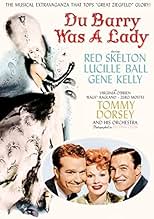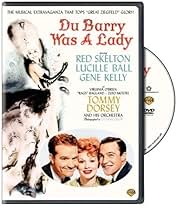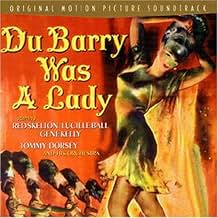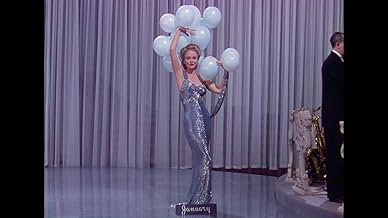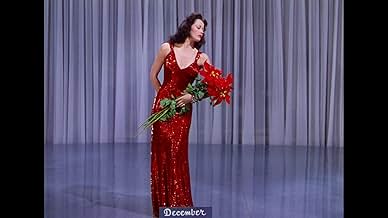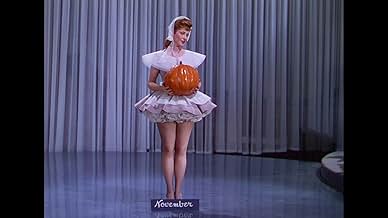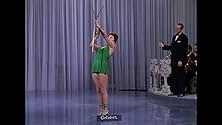NOTE IMDb
6,2/10
1,8 k
MA NOTE
Ajouter une intrigue dans votre langueA nightclub's coatroom attendant who's in love with the club's singer accidentally sips a drugged drink that makes him dream he's French King Louis XV, courting the infamous Madame Du Barry.A nightclub's coatroom attendant who's in love with the club's singer accidentally sips a drugged drink that makes him dream he's French King Louis XV, courting the infamous Madame Du Barry.A nightclub's coatroom attendant who's in love with the club's singer accidentally sips a drugged drink that makes him dream he's French King Louis XV, courting the infamous Madame Du Barry.
- Réalisation
- Scénario
- Casting principal
- Récompenses
- 1 victoire au total
Rags Ragland
- Charlie
- (as 'Rags' Ragland)
- …
Richard Ainley
- Marching Rebel Behind King Louis
- (non crédité)
Grace Albertson
- Perfume Girl
- (non crédité)
Kay Aldridge
- Mrs. McGowan
- (non crédité)
Ernie Alexander
- Delivery Man with Flowers
- (non crédité)
Richard Alexander
- Marching Rebel Behind King Louis
- (non crédité)
Avis à la une
MGM bought a seventeen song musical comedy, threw out thirteen songs ("It Ain't Etiquette", "Well, Did You Evah", and "But In The Morning, No" can still be heard as backg round music) and had five studio composers take care of the rest of the score ("Salome" is their best contribution).
The plot--Film takes place in a nightclub. Louis (Skelton) is in love with May (Lucille Ball). After he accidentally drinks a Mickey, he dreams he's back in 1743 France, where he is Louis XV, and May is Madame DuBarry.
To me, Skelton is unbearable when he plays stupid; here, he takes forever to get the idea he's back in France, and tramples jokes into the ground. I don't know if that's his fault or the fault of director Del Ruth.
Ball is good as May/Madame DuBarry. She saves the second half of the film with her comedy skills where she makes a fool out of Louis XV. She is dubbed for most of her songs, but her real voice can be heard in the song "Friendship".
Gene Kelly is good as Alec/The Black Arrow. He has the best song ("Do I Love You") and an excellent dance number on the nightclub stage.
Virginia O'Brien makes "Salome" a memorable song. Look for Marilyn Maxwell in a bit , and Lana Turner in an uncredited bit.
The plot--Film takes place in a nightclub. Louis (Skelton) is in love with May (Lucille Ball). After he accidentally drinks a Mickey, he dreams he's back in 1743 France, where he is Louis XV, and May is Madame DuBarry.
To me, Skelton is unbearable when he plays stupid; here, he takes forever to get the idea he's back in France, and tramples jokes into the ground. I don't know if that's his fault or the fault of director Del Ruth.
Ball is good as May/Madame DuBarry. She saves the second half of the film with her comedy skills where she makes a fool out of Louis XV. She is dubbed for most of her songs, but her real voice can be heard in the song "Friendship".
Gene Kelly is good as Alec/The Black Arrow. He has the best song ("Do I Love You") and an excellent dance number on the nightclub stage.
Virginia O'Brien makes "Salome" a memorable song. Look for Marilyn Maxwell in a bit , and Lana Turner in an uncredited bit.
This 1943 Arthur Freed production had a great cast, gorgeous Technicolor, various personalities of the day like Tommy Dorsey (and Dick Haymes and Jo Stafford singing in the flashback sequence), but it's a rather boring film. It's a movie made for a person with the intellect of a fifth grader. I had to stop the film after an hour and watch it the next day to complete it, as my patience had reached its limit for the day. I will say that many musicals of the day had puerile plots, but this one really was on the lower half of the scale.
Lucy and Red, both talented, didn't strike me as all that funny. And Lucy singing with Rita Hayworth's voice double Martha Mears looked and sounded strange. When you're looking for Rita, and you get Lucy, it is quite the shock. I will admit that after checking my facts Martha sang for Lucy before she sang for Rita in Cover Girl one year later, but I still "heard" Rita singing.
Gene was good as always but I couldn't quite see why he wanted Lucy so much. She was beautiful but cold in an icy manner.
Clara "Auntie Em" Blandick had a small bit in a subway which was quite good. And Lana Turner also appears in the film in an uncredited cameo.
Virginia O'Brien, always fun, helped the proceedings as well.
If you're a fan of the MGM musical, you should see it, but it's not a film that will make a list of the top film musicals.
Lucy and Red, both talented, didn't strike me as all that funny. And Lucy singing with Rita Hayworth's voice double Martha Mears looked and sounded strange. When you're looking for Rita, and you get Lucy, it is quite the shock. I will admit that after checking my facts Martha sang for Lucy before she sang for Rita in Cover Girl one year later, but I still "heard" Rita singing.
Gene was good as always but I couldn't quite see why he wanted Lucy so much. She was beautiful but cold in an icy manner.
Clara "Auntie Em" Blandick had a small bit in a subway which was quite good. And Lana Turner also appears in the film in an uncredited cameo.
Virginia O'Brien, always fun, helped the proceedings as well.
If you're a fan of the MGM musical, you should see it, but it's not a film that will make a list of the top film musicals.
When MGM bought the rights to Cole Porter's DuBarry Was A Lady for the Arthur Freed unit as per usual the naughty Porter score was completely emasculated and songs old and new from a variety of sources were interpolated into the film. It was like his lyric of Friendship, a perfect blendship.
If you're attentive however you can hear at least two of the songs played as background music, When Love Beckoned and Well Did You Evah which was later interpolated by MGM into High Society for that never to be forgotten duet with Bing Crosby and Frank Sinatra. Only Friendship, Do I Love You Do I and Katie Went To Haiti made the final cut in the score.
Sad also that Ethel Merman and Bert Lahr did not get to repeat the roles they did on Broadway and Darryl Zanuck would not let Betty Grable come over from 20th Century Fox. Ethel only did two of her Broadway roles for the movies, Call Me Madam and Anything Goes and Lahr for whatever reason after the Cowardly Lion from The Wizard Of Oz was given a whole of mediocre parts.
It was said that Merman was not film box office, but certainly Lucille Ball wasn't either at that time. Red Skelton was however, his career was on the rise and so television's two most famous redheads got to team on the big screen.
Lucy is the star of a nightclub chorus and Red is the hat check man who hits the lottery. He's been crushing out on Lucy for forever, but now that he's rich he thinks she might give him a second look. He puts the big moves on her. but she can only see hoofer Gene Kelly. Still his money is tantalizing.
When Red tries to slip Gene a mickey finn he winds up drinking it himself and dreams he's back in the court of Louis XV as Louis XV with Lucy as the notorious Madame DuBarry. And Kelly turns up as the dashing rebel the Black Arrow, rival for the affections of the Madame.
In both the modern and period story MGM packed a lot of entertainment in the 89 minute running time. What court or nightclub would not like to have Tommy Dorsey and his Orchestra as its personal band? There are some nice solos by drummer Buddy Rich and singing with the Pied Pipers are Jo Stafford and newly arrived vocalist Dick Haymes.
Virginia O'Brien contributes a few numbers. She never did any acting roles of note, but was always welcome in an MGM production for her singing and devastating dead pan delivery of a song. Making his big screen debut as the nightclub fortune teller was Zero Mostel with just a trace of his zaniness in play.
This was one of the few films that Gene Kelly was in that he really did not have control of his material yet. Nevertheless his Black Arrow persona was a hint of what you saw later in a high flying dance number in Anchors Aweigh and in The Three Musketeers and The Pirate.
A thin plot is just an excuse to hang a lot of comedy and musical entertainment. But what I would have given to see Merman and Lahr do a faithful adaption on screen.
If you're attentive however you can hear at least two of the songs played as background music, When Love Beckoned and Well Did You Evah which was later interpolated by MGM into High Society for that never to be forgotten duet with Bing Crosby and Frank Sinatra. Only Friendship, Do I Love You Do I and Katie Went To Haiti made the final cut in the score.
Sad also that Ethel Merman and Bert Lahr did not get to repeat the roles they did on Broadway and Darryl Zanuck would not let Betty Grable come over from 20th Century Fox. Ethel only did two of her Broadway roles for the movies, Call Me Madam and Anything Goes and Lahr for whatever reason after the Cowardly Lion from The Wizard Of Oz was given a whole of mediocre parts.
It was said that Merman was not film box office, but certainly Lucille Ball wasn't either at that time. Red Skelton was however, his career was on the rise and so television's two most famous redheads got to team on the big screen.
Lucy is the star of a nightclub chorus and Red is the hat check man who hits the lottery. He's been crushing out on Lucy for forever, but now that he's rich he thinks she might give him a second look. He puts the big moves on her. but she can only see hoofer Gene Kelly. Still his money is tantalizing.
When Red tries to slip Gene a mickey finn he winds up drinking it himself and dreams he's back in the court of Louis XV as Louis XV with Lucy as the notorious Madame DuBarry. And Kelly turns up as the dashing rebel the Black Arrow, rival for the affections of the Madame.
In both the modern and period story MGM packed a lot of entertainment in the 89 minute running time. What court or nightclub would not like to have Tommy Dorsey and his Orchestra as its personal band? There are some nice solos by drummer Buddy Rich and singing with the Pied Pipers are Jo Stafford and newly arrived vocalist Dick Haymes.
Virginia O'Brien contributes a few numbers. She never did any acting roles of note, but was always welcome in an MGM production for her singing and devastating dead pan delivery of a song. Making his big screen debut as the nightclub fortune teller was Zero Mostel with just a trace of his zaniness in play.
This was one of the few films that Gene Kelly was in that he really did not have control of his material yet. Nevertheless his Black Arrow persona was a hint of what you saw later in a high flying dance number in Anchors Aweigh and in The Three Musketeers and The Pirate.
A thin plot is just an excuse to hang a lot of comedy and musical entertainment. But what I would have given to see Merman and Lahr do a faithful adaption on screen.
Nightclub singer dreams of marrying into money but is in love with a poor fellow. Fluffy musical comedy plays like a variety show, with minimal plot holding together musical numbers and comedy skits. The film looks good in Technicolor, with red hairs of Skelton and Ball (dyed for this film and kept so thereafter) featured prominently. It's nothing special, but it's not terribly painful to watch either. Lucy mostly plays it straight while Skelton provides the comedy as a hat check man who wins the sweepstakes and woos Lucy. In only his second film, Kelly completes an unlikely love triangle as Lucy's poor and sullen boyfriend.
Most people who know of Lucille Ball's career arc are aware that this was one of her higher-profile films, with a large budget, vibrant color, and A-list co-stars. What could go wrong? Well, nothing at the time. But with the passage of time the movie has gotten a bit stale, and drags in several parts. Ball's materialistic character is not very likable from the start, and she's introduced in a ghastly musical number with very conspicuously dubbed vocals. Couldn't they have found someone who's voice actually sounded like it could possibly be coming out of Lucille Ball?
They should have cast Ethel Merman, who played May Daly on Broadway. After all, the character didn't HAVE to be drop dead gorgeous. But it does help explain why two men would continue to pursue such an obviously shallow diva, even if she can't really sing.
The main event of this film is a dream sequence, but the setup to that point seems interminable! And all we have to keep us watching in between is one outstanding dance number by a game Gene Kelly and mildly witty banter between Red Skelton and an underused Virginia O'Brien. Skelton would be much better later in his career by toning down the Vaudevillesque physical comedy, which only appears more cloyingly corny with age. (Bert Lahr, who played the stage role was the same way.) There is also a musical interlude with three gentlemen who do vocal impressions that will definitely have you pushing the fast-forward button on your remote.
If you have the patience, there are some enjoyable musical numbers and just a few genuine laughs to keep you amused. The funniest line by far in the film is delivered by uncredited old lady Clara Blandick (Auntie Em from "The Wizard of Oz") in one of the Cleanest Subway Cars Ever to be used as a movie setting. That says it all about the dialogue between the leads. (The reason being is the good stuff from the Broadway show was deemed too lewd for the film.)
Obviously a lot went into the costumes and scenery for this film, and that alone makes it worth watching, as well as for the cast members who are always worth watching even if this isn't their best by any stretch.
They should have cast Ethel Merman, who played May Daly on Broadway. After all, the character didn't HAVE to be drop dead gorgeous. But it does help explain why two men would continue to pursue such an obviously shallow diva, even if she can't really sing.
The main event of this film is a dream sequence, but the setup to that point seems interminable! And all we have to keep us watching in between is one outstanding dance number by a game Gene Kelly and mildly witty banter between Red Skelton and an underused Virginia O'Brien. Skelton would be much better later in his career by toning down the Vaudevillesque physical comedy, which only appears more cloyingly corny with age. (Bert Lahr, who played the stage role was the same way.) There is also a musical interlude with three gentlemen who do vocal impressions that will definitely have you pushing the fast-forward button on your remote.
If you have the patience, there are some enjoyable musical numbers and just a few genuine laughs to keep you amused. The funniest line by far in the film is delivered by uncredited old lady Clara Blandick (Auntie Em from "The Wizard of Oz") in one of the Cleanest Subway Cars Ever to be used as a movie setting. That says it all about the dialogue between the leads. (The reason being is the good stuff from the Broadway show was deemed too lewd for the film.)
Obviously a lot went into the costumes and scenery for this film, and that alone makes it worth watching, as well as for the cast members who are always worth watching even if this isn't their best by any stretch.
Le saviez-vous
- AnecdotesMGM hairstylist Sydney Guilaroff dyed Lucille Ball's hair flame red for this film, the color that she kept for the rest of her life and became her trademark.
- GaffesDuring the scene in Madame Du Barry's boudoir when King Louis XV is chasing Du Barry around the dressing table, a man sitting in a chair can be seen reflected in the mirror.
- Crédits fousThe Three Oxford Boys are credited orally by the MC ('Gene Kelly') as The Oxford Boys.
- Versions alternativesThis film was published in Italy in an DVD anthology entitled "Cover Girl", distributed by DNA Srl. The film has been re-edited with the contribution of the film history scholar Riccardo Cusin . This version is also available in streaming on some platforms.
- ConnexionsEdited into American Masters: Gene Kelly: Anatomy of a Dancer (2002)
- Bandes originalesDu Barry Was a Lady
(1943)
Music by Burton Lane
Lyrics by Ralph Freed
Played during the opening credits
Sung by Lucille Ball (dubbed by Martha Mears) and chorus at the nightclub
Meilleurs choix
Connectez-vous pour évaluer et suivre la liste de favoris afin de recevoir des recommandations personnalisées
Détails
- Date de sortie
- Pays d’origine
- Langue
- Aussi connu sous le nom de
- La Dubarry era una dama
- Lieux de tournage
- Société de production
- Voir plus de crédits d'entreprise sur IMDbPro
Box-office
- Budget
- 1 239 222 $US (estimé)
- Durée1 heure 41 minutes
- Rapport de forme
- 1.33 : 1
Contribuer à cette page
Suggérer une modification ou ajouter du contenu manquant

Lacune principale
What is the Spanish language plot outline for La du Barry était une dame (1943)?
Répondre

